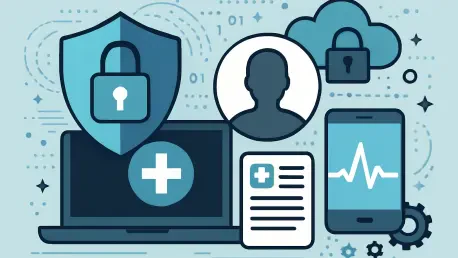In a bold move that has ignited fierce debate across the nation, U.S. Health Secretary Robert F. Kennedy Jr., alongside President Donald Trump, has unveiled a groundbreaking private health tracking system designed to integrate Americans’ health data with government and Big Tech platforms. Announced at a high-profile White House event titled “Making Health Technology Great Again,” this initiative promises to revolutionize healthcare by allowing individuals to access and monitor their medical records seamlessly across various technologies. Yet, the plan has raised alarm bells among privacy advocates and critics who question the safety of sharing such sensitive information with corporate giants like Amazon, Apple, and Google. The controversy is further fueled by RFK Jr.’s past outspoken criticism of data exploitation by tech firms, creating a complex narrative of innovation versus ethical concerns. This development poses a critical question: can the benefits of digital health empowerment outweigh the potential risks to personal privacy in an era where data breaches are all too common?
Unveiling a New Health Tech Vision
The newly proposed health tracking system aims to break down digital barriers in healthcare, giving patients unprecedented control over their wellness data. RFK Jr. has framed this initiative as a cornerstone of the “Make America Healthy Again” campaign, emphasizing that it empowers individuals to make informed decisions about their diet, exercise, and lifestyle through real-time health metrics. Supporters, including major tech companies, argue that seamless data sharing between doctors, hospitals, and health apps will lead to more personalized and efficient medical care. The system is designed to integrate wearable fitness technology, enabling users to track vital statistics and share them directly with healthcare providers. While the vision of a connected, patient-centered health framework is appealing, the involvement of Big Tech raises questions about how much control individuals will truly retain over their information. The promise of accessibility must be weighed against the reality of corporate interests that may prioritize profit over privacy.
Beyond the optimistic rhetoric, the announcement has revealed a stark contrast in RFK Jr.’s stance on data sharing. Previously, he voiced deep concerns about tech companies exploiting personal information for commercial gain, warning of a future where individuals become permanent consumers under corporate surveillance. His recent endorsement of data-driven health solutions, however, suggests a shift toward embracing technology as a tool for personal responsibility. This apparent pivot has left many puzzled, with critics pointing out the inconsistency between past warnings and current policy. The administration, alongside figures like David Sacks and Mehmet Oz, stands firm in its commitment to modernizing healthcare through this partnership. Yet, the lingering skepticism about RFK Jr.’s change of heart underscores a broader unease about whether the government can adequately oversee such an ambitious and far-reaching program without compromising fundamental rights.
Privacy Concerns Take Center Stage
As the health tracking system gains traction, privacy concerns have emerged as a dominant point of contention among experts and the public alike. Critics argue that sharing sensitive medical records with Big Tech firms opens the door to potential misuse, where data could be leveraged for purposes beyond healthcare, such as targeted advertising or even discrimination. Lawrence Gostin, a public health law professor at Georgetown University, has cautioned that patients should remain vigilant about how their information might be used in ways that could harm them or their families. The fear is not unfounded, given past instances of data breaches and the opaque practices of some tech giants. While the initiative promises enhanced health management, the lack of robust safeguards and transparency about data handling practices has fueled distrust. The ethical implications of this plan cannot be ignored, as the line between innovation and intrusion becomes increasingly blurred in a digital age.
Moreover, the polarized response to this initiative highlights a deeper societal tension between technological progress and personal security. On one hand, proponents within the administration and tech industry celebrate the system as a transformative step toward a responsive healthcare framework that prioritizes individual needs. On the other hand, detractors emphasize the risk of corporate overreach, pointing to a lack of trust in how these companies will protect such intimate data. The potential for abuse—whether through unauthorized access or profit-driven exploitation—casts a shadow over the touted benefits of accessibility. As the debate unfolds, it becomes evident that any advancement in health technology must be accompanied by stringent regulations to ensure that personal information remains secure. Without clear guidelines and accountability measures, the promise of empowerment could easily morph into a loss of control for millions of Americans.
Balancing Innovation with Ethical Standards
Looking back, the announcement of this health data sharing plan marked a pivotal moment in the ongoing struggle to balance technological innovation with ethical responsibility. The initiative, while ambitious in its goal to modernize healthcare, stirred significant controversy due to the inherent risks of partnering with Big Tech. The polarized reactions—from enthusiastic support by industry leaders to sharp criticism from privacy advocates—reflected the complexity of integrating digital solutions into personal health management. RFK Jr.’s shift from a critic of data exploitation to a proponent of data-driven health tools added another layer of scrutiny to the policy, raising questions about consistency and intent. Ultimately, the event underscored a critical need for vigilance as society navigates the intersection of health, technology, and privacy.
Moving forward, the focus must shift to establishing robust safeguards and transparent policies to protect individuals’ data under this new system. Stakeholders should prioritize the development of strict regulations that limit how information can be used and ensure accountability from both government and corporate entities. Public education on data rights and consent will also be essential to empower users to make informed choices about sharing their health records. As discussions continue, lawmakers and tech leaders must collaborate to address privacy concerns head-on, potentially setting a precedent for future digital health initiatives. Only through a commitment to ethical standards can the promise of a connected healthcare system be realized without sacrificing the trust and security of the American public.









